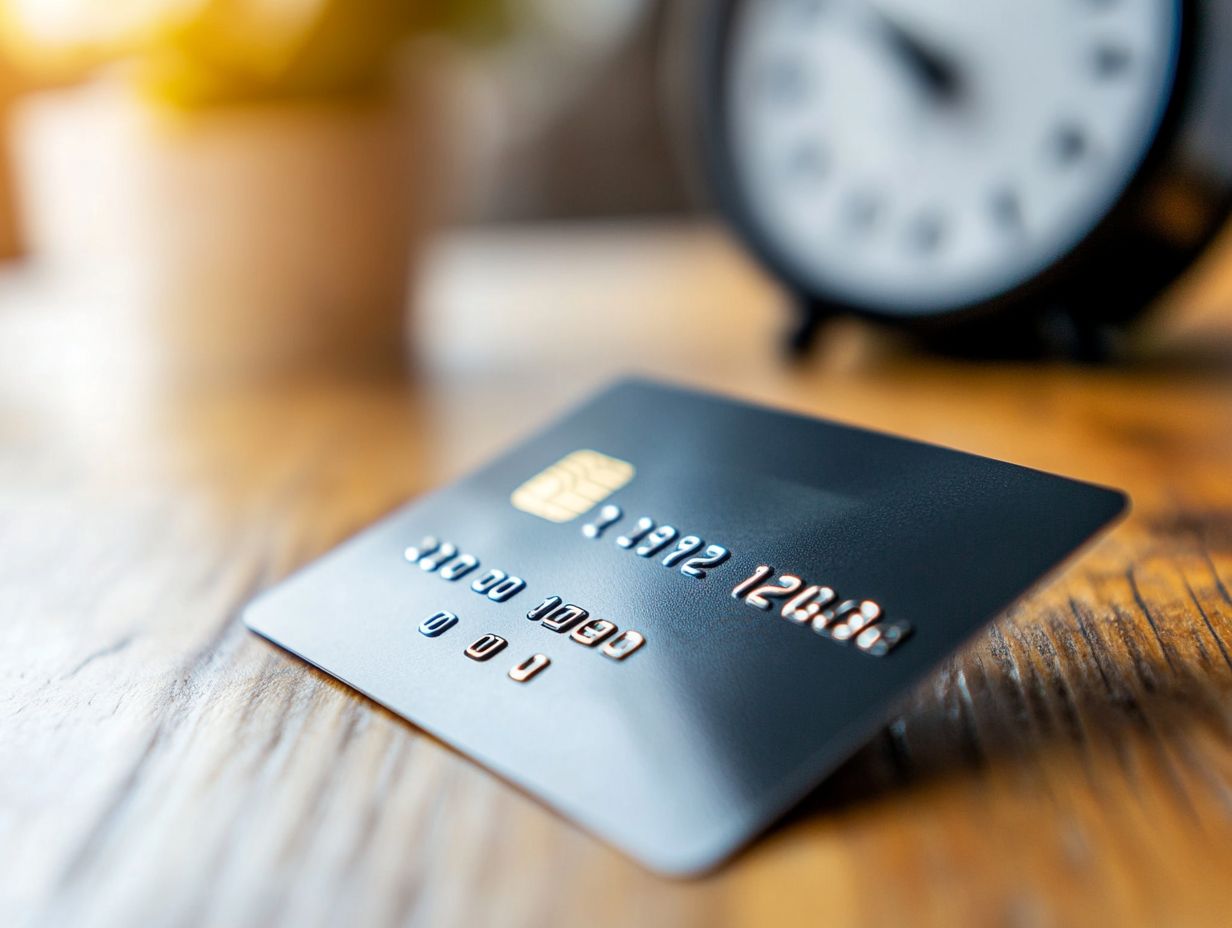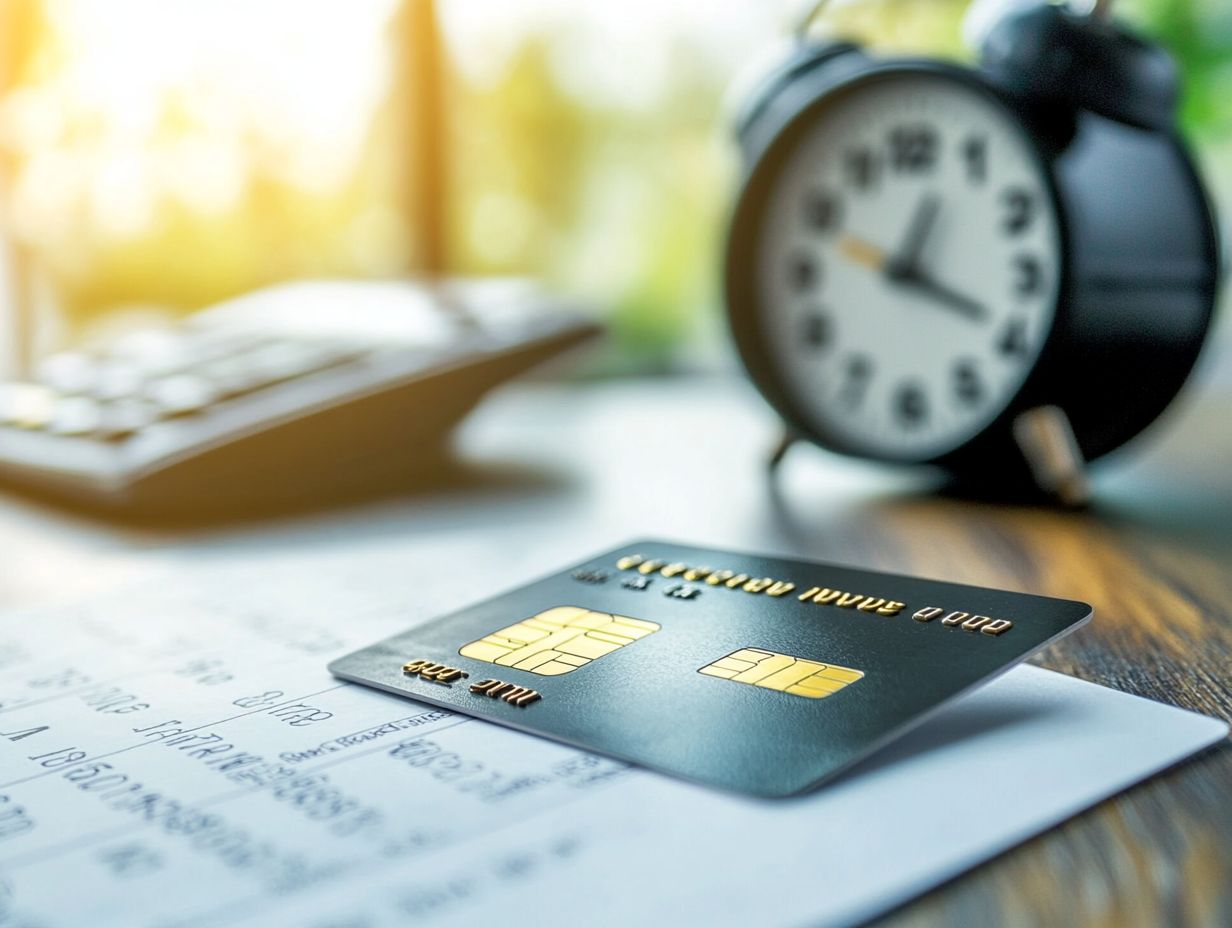What is a Credit Card Grace Period?
Understanding credit cards can feel daunting, especially when trying to make sense of the many terms and features.
One important idea is the credit card grace period. This article will help you discover what a grace period is, its purpose, and how it works.
You will explore its benefits, clear up common misconceptions, and receive valuable tips on maximizing this feature. We will also discuss alternative payment options to help you manage your finances more effectively.
Understanding these elements will help you use your credit card wisely, ultimately saving money and enhancing your financial flexibility.
Contents
- Key Takeaways:
- Understanding Credit Card Grace Periods
- How Credit Card Grace Periods Work
- Benefits of a Credit Card Grace Period
- Common Misconceptions about Credit Card Grace Periods
- Maximizing the Benefits of a Credit Card Grace Period
- Smart Alternatives to Grace Periods
- Frequently Asked Questions
- What is a Credit Card Grace Period?
- How long is a Credit Card Grace Period?
- Does every credit card have a Grace Period?
- Can I still accrue interest during the Credit Card Grace Period?
- What happens if I miss the payment deadline during the Grace Period?
- Are there any fees associated with using the Credit Card Grace Period?
Key Takeaways:

- A credit card grace period is a time when you can pay off your credit card balance without incurring interest charges.
- To take advantage of this period, you must pay your full balance by the due date and not carry over any balances from previous months.
- Maximize the benefits by paying your balance in full each month and using responsible credit card practices.
Understanding Credit Card Grace Periods
Credit card grace periods allow you to avoid interest charges on your purchases if you pay off the full balance by the due date. This period resets with each billing cycle, giving you opportunities to make responsible financial choices.
By understanding the grace period, you can manage how much credit you use and maintain a healthy credit score. It s essential to review your credit card agreement to understand the specifics of the grace period and how it affects your overall financial well-being.
Definition and Purpose
The grace period serves as a vital financial tool, allowing you to avoid interest charges on your credit card purchases as long as you make your payments on time. This timeframe encourages responsible financial decisions and helps cultivate good credit habits.
Think of it as a safety net, giving you the chance to pay off your charges without the pressure of accumulating interest. For example, many credit card companies offer a grace period of about 21 to 25 days after the billing cycle closes. During this time, you can settle your outstanding balance without incurring extra costs.
However, different issuers have their own policies; some may not provide a grace period on cash advances or balance transfers. This can impact your credit utilization rate and your credit score. Understanding each issuer’s terms is crucial, as effectively leveraging the grace period can enhance your financial health.
How Credit Card Grace Periods Work
Credit card grace periods allow you to pay your statement balance in full without incurring interest charges on your purchases if you make the payment by the due date.
This advantageous arrangement applies within a specific billing cycle; however, it stops if you carry an unpaid balance. To truly benefit, it s essential to understand the terms set by your credit card issuer, including any criteria for renewing that grace period.
Timeline and Requirements
Understanding the timeline and requirements of a credit card grace period is essential for avoiding interest charges. Generally, this period starts on the first day of your billing cycle and lasts until the payment due date.
During this crucial window, which typically lasts around 21 to 25 days, it’s important to stay informed about your credit card terms. Some agreements may have varying stipulations that could impact your grace period.
To take full advantage of this grace period, ensure that your payments are received by the due date, which can differ depending on the issuer. Missing this date may lead to interest piling up and could also impact your credit score.
By understanding these timelines and sticking to them, you can manage your finances more effectively.
Benefits of a Credit Card Grace Period

The benefits of a credit card grace period go far beyond just saving on interest. They offer you a chance for financial flexibility.
This grace period lets you manage your expenses without immediate financial pressure. If used wisely, you can avoid interest on purchases and boost your credit score.
Interest Savings and Financial Flexibility
A credit card grace period gives you a chance for significant interest savings. This flexibility helps you manage your expenses easily.
By using the grace period wisely, you can develop good financial habits. Timely payments help you avoid interest charges and strengthen your payment history.
Improving your credit score can qualify you for lower interest rates and better credit offers. This flexibility lets you handle unexpected expenses with confidence and less stress.
Common Misconceptions about Credit Card Grace Periods
Credit card grace periods offer notable advantages, but many misconceptions exist. These misunderstandings can lead to poor financial decisions.
One common myth is that the grace period applies to all transactions, including cash advances. However, cash advances typically incur immediate interest charges.
Many cardholders think that missing a payment means only late fees. They overlook the long-term effects this can have on their credit score.
Clarifying Misunderstandings
Understanding grace periods is essential for smart credit card use. Many people don t know that grace periods don t apply to cash advances or balance transfers.
Think of the grace period as a precious window to pay down your balance without interest. This period usually lasts from 21 to 25 days.
If you take a cash advance, interest starts right away. For example, if you take a cash advance on a Wednesday and pay it off by the next due date, you could face significant interest charges.
Understanding these details allows you to make smarter financial choices. This leads to better management of your credit.
Maximizing the Benefits of a Credit Card Grace Period
To fully enjoy the benefits of a credit card grace period, practice responsible credit card use. Understand your card’s features and commit to making full payments by the due date.
Stick to a disciplined payment schedule within each billing cycle. This approach helps you enjoy an interest-free experience and enhances your credit score.
By leveraging the grace period effectively, you develop positive financial habits for the long run.
Tips for Responsible Credit Card Use

Engaging in responsible credit card use is vital for reaping the full benefits of grace periods. It all starts with making timely payments by the end of each billing cycle. By managing your payment options and prioritizing punctuality, you can avoid interest charges while maintaining an impressive credit score.
To elevate this practice, establish a clear budget that outlines your monthly income and expenditures. Tracking your spending helps you allocate specific funds for credit card payments, simplifying the process of clearing your balance in full.
Set up reminders for payment due dates to help you sidestep late payments, which often result in unwelcome fees. Regularly reviewing your statements allows you to spot any unusual charges and keeps you within your financial limits.
Cultivating these habits enhances your credit score and promotes responsible spending, setting you on the path to financial success.
Smart Alternatives to Grace Periods
While grace periods present valuable benefits, consider alternative payment options that offer similar advantages such as balance transfers or interest-free promotional offers. These alternatives can help manage credit card debt more effectively and might even allow you to avoid interest charges entirely, depending on your credit card terms.
By evaluating various financial strategies, you can select the best approaches that align with your unique financial situation while still enjoying the benefits of credit cards.
Let s Explore Other Payment Options
Exploring different payment options within the credit card landscape can unlock significant financial benefits for you. Consider strategies like balance transfers and interest-free promotional periods; they offer alternative ways to manage your debt effectively.
You can also tap into rewards programs to elevate your experience. These programs allow you to earn points or cashback on purchases while chipping away at your overall balance. Look into payment plans that enable smaller, more manageable installments, providing a structured repayment approach without interest.
Another smart move is to seek credit cards that offer grace periods on new purchases. This gives you a valuable window to settle your expenses before interest kicks in. Each of these options complements traditional grace periods and serves as a viable alternative, especially for those aiming to streamline budgeting and enhance their financial health.
Frequently Asked Questions
What is a Credit Card Grace Period?
A credit card grace period is the time given to credit card holders to pay their outstanding balances without incurring interest charges.
How long is a Credit Card Grace Period?

The length of a Credit Card Grace Period varies depending on the credit card issuer and type. Generally, it ranges from 21 to 25 days.
Does every credit card have a Grace Period?
No, not all credit cards offer a Grace Period. Some credit cards charge interest from the day the transaction is made, while others provide a Grace Period before charging interest.
Can I still accrue interest during the Credit Card Grace Period?
No, as long as you pay your balance in full before the end of the Grace Period, you will not be charged any interest on your purchases.
What happens if I miss the payment deadline during the Grace Period?
If you miss the payment deadline during the Grace Period, you may incur interest charges on your outstanding balance. Always make payments on time to avoid these charges.
Are there any fees associated with using the Credit Card Grace Period?
No, there are no additional fees for using the Credit Card Grace Period. It is a benefit provided by credit card issuers to help cardholders manage their finances.






